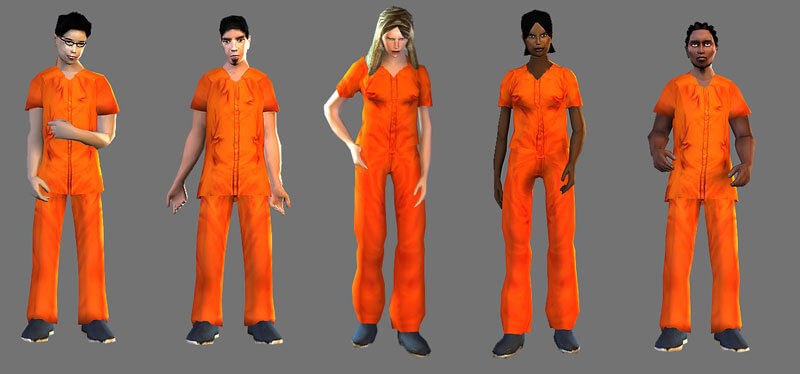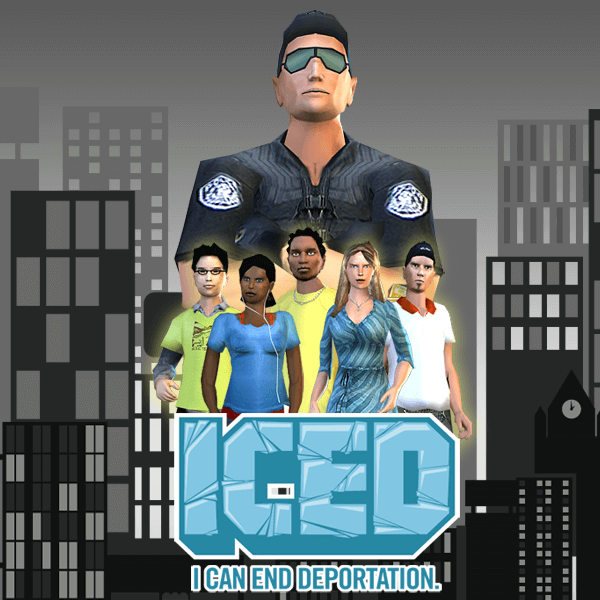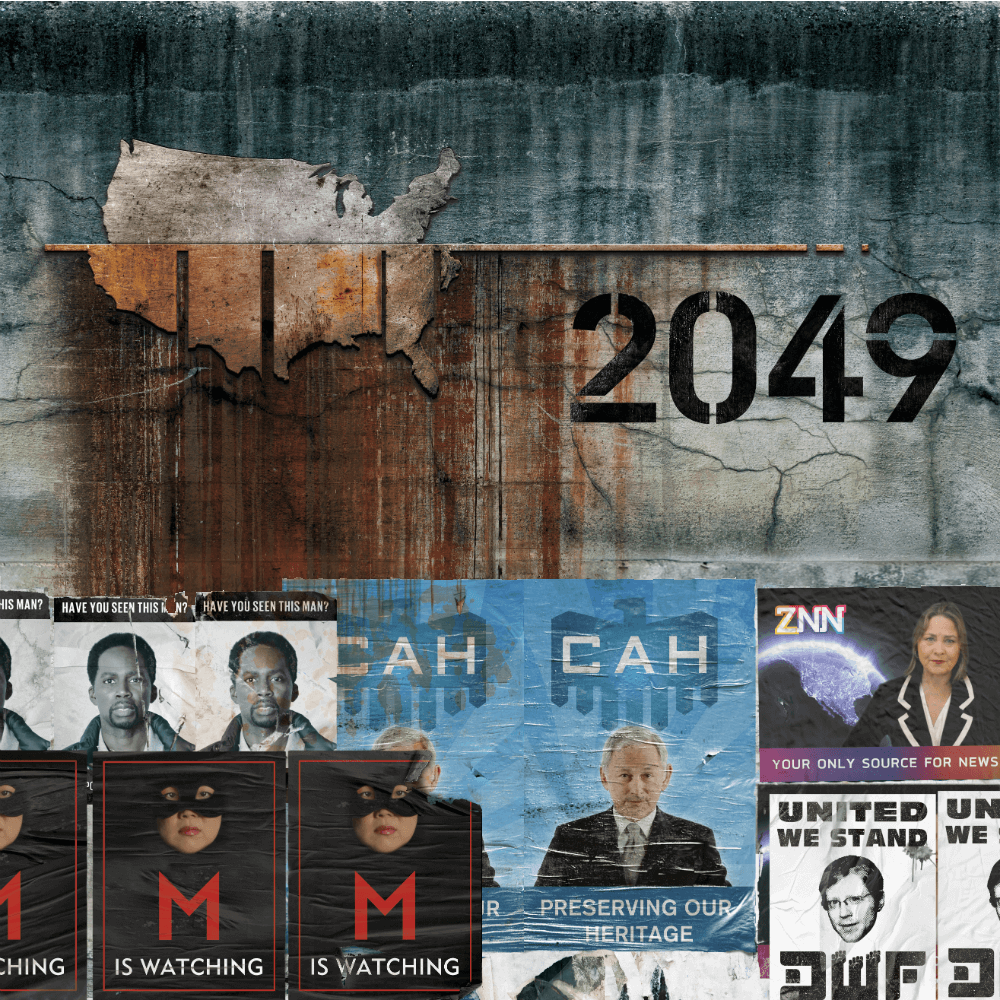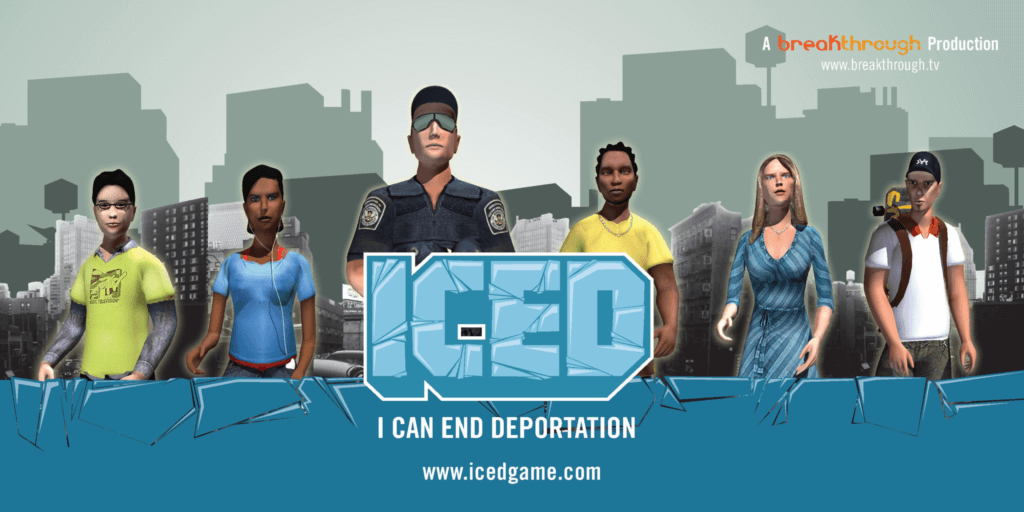GAMEPLAY
THE OBJECT OF THE GAME IS TO BECOME A CITIZEN OF THE UNITED STATES
As an immigrant teen you are avoiding ICE officers, answering myth/fact questions on immigration, and doing things for your community. But if you answer questions incorrectly, or make poor decisions, you will be detained with no respect for your human rights.
If you do these things successfully, you have the chance of becoming a citizen of the United States. But the odds are against you.

Since 2001, over 4.4 million people have been deported from the U.S. No one is safe from deportation—the sick and elderly, pregnant women, families, green card holders, and even people escaping other countries where they might have been tortured for their beliefs. Right now, there are hundreds of thousands of immigrants being detained in horrendous conditions. They have no idea of their destiny. They do not have access to due process. They are not given the legal rights that U.S. citizens have. Are these our American values? Detaining immigrants breaks up families and destroys their lives. It is a myth that detaining immigrants keeps America safe.
In Level One, players answer myth/fact questions, make moral decisions, and earn civic points. Any wrong decision sets an ICE officer after the player.
![]()
If you lose too many points, ICE officers will detain you. If you’re successful at answering the questions and avoiding the immigration officers, you’ll have the chance to play a minigame to become a citizen.
Between Level One and Level Two – Detention
If you answer myth/fact questions correctly, make the correct moral decisions and collect all civic points, you enter the immigration sweep minigame.
Despite all your best efforts to be an upstanding member of the community, you are still vulnerable to being apprehended by ICE and detained. If you successfully avoid immigration officers, you win your naturalization papers. Of course, in the real world, immigrants aren’t rewarded this way. Many end up in immigration detention centers.
Welcome to detention.
You have just joined tens of thousands of immigrants who are locked up and fighting their deportation order.
Even though you’re from New York, the Department of Homeland Security can send you anywhere. Right now, you’re in Louisiana, hundreds of miles away from your friends and family.
You may be here five months, or it could be five years. There might be free lawyers in criminal court but you don’t get any here.
You can give up your fight and agree to voluntary deportation, but then you’d never see your friends and family again. Only you can decide if it’s worth it.
If you decide to stay, you must avoid getting into further trouble and keep your morale high!
In Level Two, you await the outcome of your deportation case. You answer more myth/fact questions, make moral decisions, learn facts about detention, and are finally deported or let free.
-
The Detention Center
Homeland Security uses crumbling old facilities, once even stuffing up to 200 detainees in a gym in horrible and inhumane conditions. In some detention centers detainees never get to go outside. In jails where there is outside space, free time is often limited to less than an hour a week.
Sometimes there are no payphones in jail, so detainees can’t even call family, friends, of lawyers unless they make collect calls. Between 1998 and 2008, the prison industry made 175 million dollars in profits from phone calls made by the families of those in prison.
-
The Hole
In solitary confinement – or “the hole” – you will lose all concept of time. Because you can’t do anything to get out and you may be put in chains, you might suffer from severe anxiety and could even suffer mentally. Being in the hole can make you vulnerable to sexual violence or other physical abuse.
Solitary confinement is used to punish detainees for even the smallest infractions like talking back to a guard.
-
Deportation or Release
Throughout ICED – and in real life – you can choose to give up your fight and agree to voluntary deportation, but it’s a decision that can mean never seeing loved ones again.
Agreeing to voluntary departure is hardly a “decision” made by detainees. If they do say “yes,” they may not be able to return to the U.S. for a long time, if ever.
-
Immigration Court
Immigration court might look like any other court, but it’s not. Here, you are guilty until proven innocent. Often, you won’t have a chance to prove your innocence because, like 84% of all detained immigrants, you will not have a lawyer.
CHARACTERS


22-year-old Marc knew that his family would never have enough money to send him to college. After leaving the violence in Haiti for the United States, they moved into a one-bedroom apartment in New York City. When a U.S. soldier recruiting outside of Marc’s school told him that joining the military could help him pay for college, he signed up. After returning from Iraq, college was the last place he was going.
The game highlighted detention and deportation, helping to demonstrate the unjust nature of immigration policy as well as sparking dialogue and presenting an enabling environment towards involvement, action, and possible transformation in policy.
With hundreds of thousands of downloads and extensive press coverage worldwide, ICED changed the way people think about the human rights of immigrants and the importance of due process and fairness for all.
United States immigration laws are unfair and violate human rights. These laws affect all immigrants: legal residents, those seeking asylum, students, and undocumented people.
Unfair immigration laws:
- Deny due process and deport immigrants without a hearing.
- Tie judges’ hands and prevent them from considering the circumstances of each individual case.
- Impose extreme punishment for minor offenses.
- Hold immigrants in detention indefinitely.
When we let the government deny due process and human rights for some people, we put all of our freedoms at risk.
IMPACT & REACH
ICED demonstrates how new media is an effective tool for human rights organizations to advocate and raise public awareness.
- Partnerships with more than 100 students and community groups.
- Positive changes in knowledge and attitudes toward immigration policy.
- More than 150,000 visits, 83% new visitors.
- People from 160 countries visited the site.
- Played most in the U.S., Brazil, Mexico, Canada, and Russia.
- Reached more than 28 million people through the game and media coverage, including CNN, MTV News, Los Angeles Times, Game Daily, Univision, and The Huffington Post.














